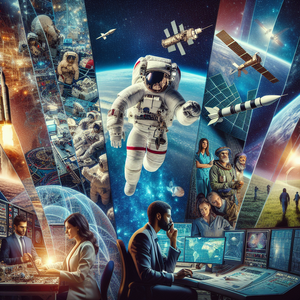
Unveiling 20 Exciting Careers in the Space Industry: Roles, Responsibilities, and Requirements
The space industry is flourishing, presenting a wide array of career paths that extend far beyond the classic roles of astronauts and mission controllers. With continuous technological advancements and growing investments from both government and private sectors, the landscape of opportunities is expanding. Today, the industry encompasses roles for engineers, scientists, technicians, finance experts, and communication specialists, among others. Insights from organizations like NASA and industry publications underscore that not only traditional roles are essential; emerging professions in areas such as cybersecurity, project management, and even creative fields are becoming increasingly relevant. This article explores 20 diverse careers in the space sector, detailing each role's responsibilities, educational requirements, and current trends in the job market.
Job Summaries:
Aerospace Engineer:
- These professionals design, develop, and test systems for both aircraft and spacecraft.
- A bachelor's degree in aerospace engineering or a related field is essential.
- Strong analytical abilities and expertise in CAD software are important.
- Positions are frequently available at NASA and top-tier aerospace firms.
- There is a steady demand in this field.
Avionics Technician:
- They install and maintain critical electronic systems in aircraft and spacecraft.
- Technical training in avionics or electronics and relevant certifications are necessary.
- Various space and aviation organizations actively seek skilled technicians.
Satellite Operations Engineer:
- Responsible for managing satellite systems
- Monitor their status and resolve any issues
- A degree in aerospace engineering or a similar field is required
- Practical experience in satellite operations is necessary
- Both government agencies and commercial satellite companies offer numerous openings
Space Scientist:
- They conduct in-depth research on celestial phenomena and planetary systems.
- A Ph.D. in physics, astronomy, or planetary science is crucial, along with robust research experience.
- Research institutions, universities, and space agencies frequently hire space scientists.
Payload Engineer:
- These engineers design and integrate scientific instruments for space missions.
- A degree in engineering or a scientific discipline, combined with project management experience, is typically required.
- Aerospace firms and research institutions often have openings in this field.
Space Policy Analyst:
- They research and analyze space-related policies, providing actionable recommendations.
- A background in public policy or law, along with strong analytical skills, is essential.
- Government agencies and think tanks often look for skilled analysts.
Mission Planner:
- They develop comprehensive plans for space missions, coordinating across various teams.
- A degree in engineering or a related field, along with project management experience, is typically needed.
- Job openings can be found at space agencies and private aerospace companies.
Robotics Engineer:
- These engineers design and build robotic systems specifically for space exploration.
- A degree in robotics or engineering, as well as programming skills, are essential.
- Positions are available at both aerospace firms and research institutions.
Astrobiologist:
- They study the potential for life beyond Earth, examining extreme environments and biological processes.
- A Ph.D. in biology or astrobiology, paired with a strong research background, is required.
- Research institutions and space agencies are actively seeking astrobiologists.
Space Data Analyst:
- These analysts interpret data from space missions and satellite observations to derive meaningful insights.
- A degree in data science or statistics and proficiency in data analysis software are necessary.
- Numerous roles exist in research institutions and space agencies.
Earth Observation Scientist:
- They utilize satellite data to monitor environmental changes on Earth.
- A degree in environmental science or geography, along with experience in remote sensing, is crucial.
- Many governmental and non-profit organizations seek these scientists.
Space Operations Manager:
- They oversee the daily operations of space missions, ensuring everything runs smoothly.
- A degree in engineering or business and adept leadership skills are typically required.
- Positions are available at both space agencies and aerospace companies.
Launch Vehicle Engineer:
- These engineers design and test rockets and spacecraft, focusing on propulsion systems.
- A degree in aerospace or mechanical engineering, along with relevant experience, is necessary.
- Numerous openings can be found within government agencies and private aerospace manufacturers.
Space Communications Specialist:
- They manage the communications between ground control and spacecraft during missions.
- A degree in telecommunications or communications engineering, along with experience in satellite communications, is essential.
- Positions are available at space agencies and telecommunications firms.
Space Education Outreach Coordinator:
- They design educational programs to promote understanding of space exploration.
- A degree in education or communications, coupled with strong organizational skills, is vital.
- Many educational institutions and non-profits are looking for coordinators.
Space Risk Management Consultant:
- These professionals assess risks associated with space missions and develop strategies to mitigate them.
- A background in risk management or engineering and strong analytical skills are needed.
- Consulting firms and aerospace companies often have openings for risk management consultants.
Cosmochemist:
- They investigate the chemical processes occurring on celestial bodies.
- A Ph.D. in chemistry or planetary science is necessary, along with research capabilities.
- Research institutions and space agencies are frequently on the lookout for cosmochemists.
Space Marketing Specialist:
- These specialists promote products and services related to space exploration.
- A degree in marketing or communications, along with experience in digital marketing, is essential.
- Roles are available in both public and private sectors.
Space Cybersecurity Analyst:
- They work to protect space systems from potential cyber threats.
- A degree in cybersecurity or IT, along with relevant certifications, is needed.
- Government agencies and private aerospace firms are actively hiring for this critical role.
Space Graphic Designer:
- These designers create visual content for space missions and educational purposes.
- A degree in graphic design and proficiency with design software are essential.
- Positions are available in various organizations involved in space science and education.
The space industry is a dynamic field experiencing significant growth, offering diverse roles that cater to a variety of skills and interests. As this sector continues to evolve, aspiring professionals should explore the specific educational pathways and skills required for their desired roles. Current job trends indicate a surge in opportunities across the board, with a notable demand for positions in emerging fields such as cybersecurity and data analysis. For those seeking to enter this exhilarating world, job boards and industry publications can provide valuable insights and openings. By aligning personal passions with meaningful careers, individuals can contribute to humanity's exploration of the cosmos while being part of a collaborative and innovative community. In summary, whether you're drawn to engineering, science, policy, or the arts, the space industry has a place for you. The possibilities are endless, and the sky is not the limit—it's just the beginning.
Explore More Jobs

